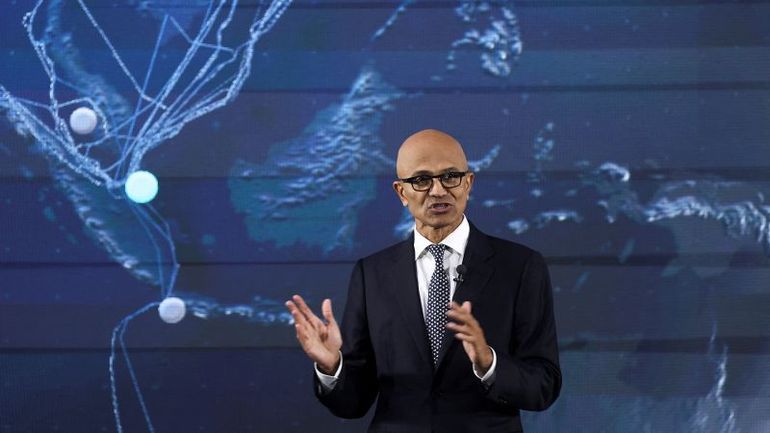
Microsoft's Innovative Approach to Revitalize PC Usage

Microsoft unveiled its latest strategy to integrate artificial intelligence into Windows OS, marking a significant leap in PC technology. The tech giant introduced cutting-edge AI computers at its developer conference in Seattle, signaling a new era of intelligent computing.
Microsoft made a big move towards integrating artificial intelligence into its Windows operating system by introducing new AI computers aimed at boosting PC sales.
During the company's annual developer conference in Seattle, CEO Satya Nadella shared that these advancements bring them closer to their goal of creating computers that can understand us, rather than us having to understand computers.
He mentioned that he feels like we are on the verge of a significant breakthrough.
The new computers are equipped with powerful processors that drive advanced AI technology. This comes at a time when PC sales have been stagnant for years. The company is optimistic that these new machines will not only increase sales but also reignite interest, especially since AI is predicted to play a bigger role in our daily lives.
Microsoft has introduced a new range of Copilot+ PCs, showcasing a fresh Surface Pro tablet and Surface laptop. These devices come equipped with AI tools that operate offline, meaning the AI processing takes place directly on the device.
These new devices highlight the capabilities of Copilot, Microsoft's AI assistant that is compatible with multiple products like Bing and Microsoft 365. Copilot can assist with various tasks such as writing, managing emails in Outlook, and creating presentations in PowerPoint.
One exciting new feature, known as Recall, functions like a personal “time machine,” making it easy for users to quickly locate items on their computer, such as documents, images, and websites. Additionally, there is a feature that offers real-time translation into over 40 languages directly on the device.
Microsoft is not the only company with ambitions for AI in PCs. Dell and Lenovo have also recently introduced AI-first PC computers as part of the Copilot+ AI lineup, a growing category that many experts believe will shape the future of computing. (Copilot+ refers to the hardware that supports the Copilot software.)
Apple will be unveiling new AI-powered tools for the iPhone and Mac at its annual Worldwide Developers Conference next month.
According to Geoff Blaber, CEO at CCS Insight, Microsoft and its partners have made a strong beginning in integrating AI capabilities. However, they will need to put in effort to ensure that AI goes beyond just a buzzword and offers meaningful features.
Microsoft’s advancements also come at a time when the PC market is ripe for innovation.
“This is a much-needed catalyst,” Blaber added.
Although the Surface line is not very big in the PC market, it is seen as a brand that people aspire to own and is known for being innovative, as stated by Jitesh Ubrani from IDC. Microsoft's recent actions show a larger trend in the industry towards AI technology.
In the coming month of June, Apple is expected to launch generative AI on its iOS and Mac devices. This type of artificial intelligence can create new content, like text from images. There are rumors that Apple may introduce an AI chatbot powered by OpenAI's ChatGPT, which is the same technology used in Microsoft's CoPilot+ line.
Microsoft has quickly become a prominent player in this field with ChatGPT integrated into important products. Their hard work seems to be yielding positive results.
In the latest report, Microsoft announced a quarterly profit of $21.9 billion, a significant increase from $18.3 billion the previous year. Revenue also saw a 17% growth year-over-year, reaching $61.9 billion. The Azure cloud business of Microsoft showed impressive growth with a revenue increase of 31%, driven by AI advancements.
The company is fully committed to advancing AI technology in various ways. Recently, Microsoft announced a $3.3 billion investment in building a data hub in Wisconsin. This hub will serve as a training center for employees and manufacturers to enhance their understanding and utilization of artificial intelligence. The ultimate goal is to generate 2,300 union construction jobs and 2,000 permanent jobs, with plans to train approximately 100,000 workers statewide.
Furthermore, Microsoft is preparing to unveil more AI-related updates at its Build conference, scheduled to kick off at noon ET on Tuesday.
Editor's P/S:
The integration of AI into PC operating systems marks a significant milestone in computing, promising to revolutionize user experiences and drive innovation in the PC market. Microsoft's introduction of AI-powered computers is a testament to the company's commitment to harnessing the transformative power of AI. By equipping devices with advanced AI capabilities, Microsoft aims to create computers that adapt to our needs, enhancing productivity, creativity, and overall user satisfaction.
The growing adoption of AI in PCs underscores the industry's shift towards leveraging technology to empower users. Companies like Dell and Lenovo are joining Microsoft in developing AI-first PC computers, recognizing the potential for AI to transform the way we interact with our devices. As AI continues to play an increasingly prominent role in our daily lives, the integration of AI into PCs will undoubtedly shape the future of computing, providing users with seamless, personalized, and intelligent experiences.













